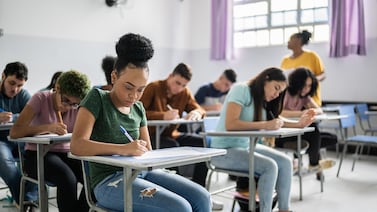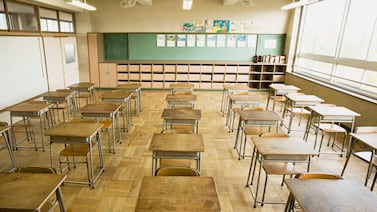Detroit district parent Sharmell Graves is worried her daughter will forget essential skills like holding a crayon.
Her daughter, a fifth grader who attends a school that serves students with severe disabilities, has cerebral palsy, which limits her motor skills. With the help of her teacher, Graves’ daughter was getting help with her muscle movements so she could perform simple tasks.
Right now, Graves is helping her daughter with coloring at home, but is worried her assistance is not as effective as what a trained professional would offer.
“I don’t want her to lose her progress,” she said.
When school buildings closed in March to slow the spread of the coronavirus, advocates warned that students with disabilities would suffer the most. As virtual learning has become more imperative, parents are worried that access to services for students with special needs will not improve for their children this fall.
Advocates worry that students like Graves’ daughter will miss out on their federally guaranteed right to a fair education. Two years ago, Michigan was identified as “needing intervention” from the U.S. Department of Education because of poor academic performance, high dropout rates, and low graduation rates among its students with special needs. The state’s designation has improved in the last two years, but Michigan is still considered in need of some federal assistance.
Special education advocate Marcie Lipsitt said many of the more than 200,000 students with disabilities had little to no access to support services in the spring.
“There was nothing for them,” she said. “There were children that sat home … who had not one minute of meaningful educational benefits.”
Special education advocates and parents are experiencing similar frustrations across the country. In Chicago, some families of students with disabilities were disappointed with a lack of access to clinicians, difficult-to-navigate online applications, and limited time with teachers and classroom aides over the summer. In New York, there may not be enough teachers to support the same level of staffing that existed before the pandemic for the district’s 100,000 students with disabilities.
Detroit district parent Darlene Waller is taking on more responsibility for her daughter Elaina’s learning. Elaina is a second grader who has autism and attention deficit hyperactivity disorder, or ADHD, meaning she has trouble focusing on tasks. Her daughter is chatty but has a hard time holding a two-way conversation.
Darlene worries Elaina will lose interest quickly if she has to stare at a computer for hours every day.
“I’m not sure how she’s gonna take to the computer even though I’ve been practicing with her. I really don’t know,” she said. “But no, I don’t think virtual will do enough.”
To help Elaina stay active, Darlene is adamant about getting her some fresh air during the week by taking her to the park and teaching her the names of trees and bugs.
In addition, Elaina, more than other children, needs practice interacting with her peers, which she does not receive when she is home learning online. “Whenever we’re out at stores and she sees a kid, she’ll beeline to that kid,” her mother said.
‘How does that translate to a computer?’
Learning is more difficult for students with disabilities when compared with their general education peers. They may have more trouble reading, writing, speaking, paying attention, or they may be blind, deaf, or hard of hearing, or have a hard time controlling their muscle movements.
A specialized education plan mandated by federal law describes each student’s learning needs and goals and includes parent input.
Most student’s specialized plans were designed for the ‘brick-and-mortar’ school setting, although some call for private treatment off-site. If a student needed one-on-one help at school, she would typically get pulled out of the classroom to work on targeted skills. But without access to special education teachers or clinicians when learning remotely, the child, with help, must fulfill those goals at home, said Kanika Littleton, the director of Michigan Alliance for Families.
“If you’re trying to help a student learn how to type, cut, write their name, or draw, you can’t help manipulate a child’s hand movement or pencil grip placement remotely,” she said.
A parent is even more involved in learning, not only as an at-home teacher, but also “an at-home social worker, an at-home therapist, or an at-home behavioral specialist,” Littleton said.
Special education staff will need to rethink the way they conduct student evaluations, which are key in figuring out what extra support students need. Educators expect some learning losses from the spring because of the extended school closures.
Littleton said some evaluations might be delayed because they can’t be done virtually. For instance, evaluations designed to observe a student’s behavior need to look at how they interact in a physical classroom.
“Is the child always getting up on their seat? Is their head always down when learning a certain subject? Are they always talking back?” she said.
Some parents are already overwhelmed with getting their children in front of the computer screen because students are trying to comprehend why they’re doing schoolwork at home during the first week of classes, special education teacher Susan Lachhman said about the students in her class.
Lachhman, who works for a Wayne County school, is teaching seven students diagnosed with autism, meaning they have trouble communicating or interacting. Some of her students can’t speak, while others can’t write by themselves.
The next few weeks will focus on building the culture of her virtual classroom: using a calendar board to help students stay on task, playing good morning songs, and helping students who can’t speak to use software that allows them to communicate by clicking on pictures. Lachhman hopes students will become accustomed to a daily virtual school routine.
“I’m learning a new way of presenting curriculum,” she said. “How would I do this in a classroom? How does that translate to a computer? How can I make this as easy as possible on the families that I’m working with? Or the kids that I’m working with?”
About 80% of the Detroit district’s students with special needs signed up for online learning this fall. A district spokesperson said students with disabilities will still get remote instruction tailored to their needs.
“Learning will be supported through lessons and activities aligned to state standards and designed to promote engagement, while targeting the identified needs of each student served,” Chrystal Wilson said.
These families also can send their children to learn face-to-face, although there may be limited staff available at some buildings, Wilson said.
Many school leaders may feel out of their comfort zone in providing virtual learning for students with disabilities, but they’re working hard to make sure their needs are met, said Karen Olex, the executive director of special populations for the Oakland Intermediate School District. The regional agency provides training, resources, and equipment to help districts serve about 21,000 special education students in the county.
“Believe me, special education directors are jumping through hoops and going around circles and doing everything they can to help their staff be prepared,” she said. “They are worried to death about these kids.”
‘You constantly have to fight for your child’
If there is a disagreement over virtual support services, Littleton encourages parents to seek out a third-party mediator to help compromise with the school.
“Parents should never be cut out of any planning process,” she said.
When students have a specialized learning plan, Littleton said districts must ensure that services they need are accessible, online or in-person. Certain equipment can’t be embedded onto an online platform, like a pencil grip that helps a student write.
“Just by design, they’re already cutting those students out,” she said.
Misty Kluck is a parent of a second grader, Tessa, who attends a Washtenaw County school. Tessa is diagnosed with autism, and also has apraxia and Down syndrome, which hamper her ability to control her body movements.
Tessa’s regression since the spring was striking. She began screaming in public, biting her fingers, and sometimes hitting her mother. She still wears headphones all day because she can’t tolerate loud noises. “It was almost as if we were completely starting over,” Kluck said. Tessa later improved through private therapy.
Kluck, who’s also a special education advocate, wants schools to send paraprofessionals or tutors to families’ homes to help students who can’t complete tasks independently. She wanted that extra help for Tessa.
“You have to constantly fight for your child,” the mother said. “COVID, all it did was it took from what we have fought for — and all this fighting that we had and anything that we had accomplished — and it basically wiped it clean.”
Lipsitt will host a rally advocating for equity in special education at 10:30 a.m. Oct. 7 at the Michigan State Capitol in Lansing.
The Michigan Alliance for Families has parent mentors to help families of students with disabilities. To find a mentor, call 1-800-552-4821.








